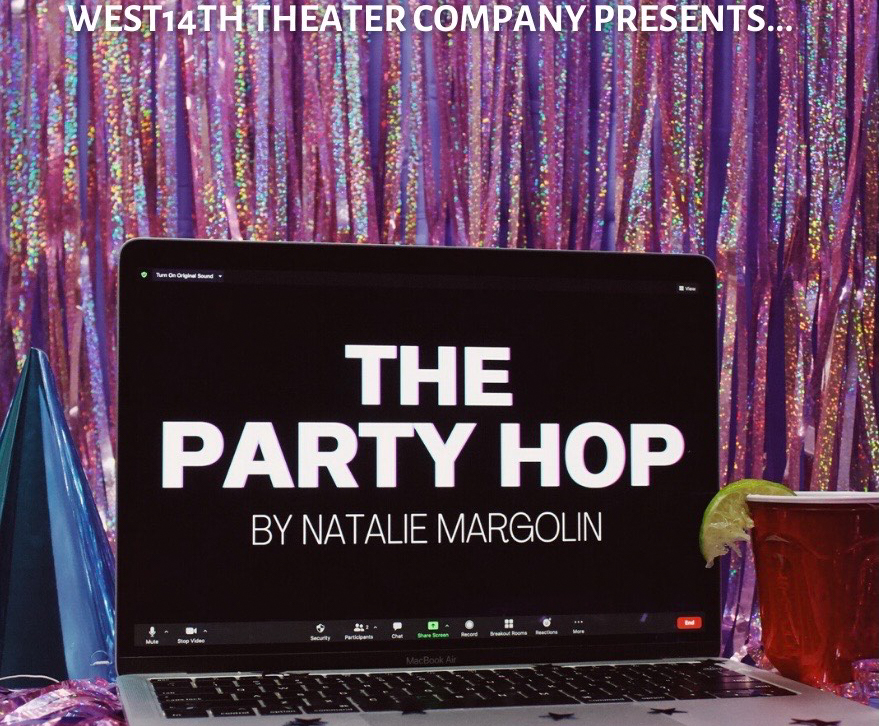Throughout the pandemic, theater fans had ample time to ponder what digital performances can offer over traditional in-person theater. For many virtual performances, the experience falls flat because there is no in-person ambience and no audience to share it with. However, immersing yourself in a remote performance can be more personal when you watch it at home, sitting on a cozy couch. The digital format makes it convenient for you to put in your headphones as you hop on the subway or watch it after your last class of the day. Even though an in-person performance is ideal, we are all starting to realize that a screen works too — especially when the play is meant to be experienced virtually.
West 14th Theater Company performed and streamed Natalie Margolin’s “The Party Hop” Live on ShowTix4U on March 18 and March 21. Set on a Saturday night three years into the pandemic, Zoom parties have now become the norm in Margolin’s world. As three college sophomores get ready for a night of virtual party hopping, their night out takes a hilarious and awkward turn as Emma (Madeline Rostmeyer) and Nancy (Esther Kohl) convince Ava (Christa Ciesil) to have her first kiss in a breakout room with her crush. Unlike West 14th’s previous productions, “The Party Hop” is the first play presented by the company that is written specifically to be watched on a screen.
“I just found [the play] to be super timely and super fun, and just something lighter, when everything else just feels so intense and heavy,” said Kira Lukasik, the West 14th co-founder and executive producer.
Lukasik, along with co-founders Ravi Schwartz and Nora Lullo, attend Atlantic Acting School. Even though their whole studio experiences at Tisch moved to remote instruction,they wanted to continue creating art. They founded West 14th Theater Company in May of last year.
The creative team and cast of “The Party Hop” is entirely composed of current Tisch Drama students studying at the Atlantic studio. Since they just entered the professional industry, they had to find different ways to make simple actions, like hugging and dancing, look authentic on Zoom. Their training took place in-person up until the outbreak of the pandemic.
“Doing theater over Zoom is so incredibly complicated, and we’re lucky now that we are doing a play that’s made to be performed over Zoom,” Schwartz said. In addition to co-founding the company, she is also the co-artistic and producing director.
Given most people spend most of their time staring at screens these days, directors have a hard time coming up with innovative ways of connecting with audiences. Directed by Schwartz, the “Party Hop,” highlights how our virtual lives have shaped our behaviors and connections with others. The play includes subtle details that resemble our own online experience: the awkward silence of a two-person breakout room, the collective reaction to a hilarious virtual background and the embarrassing moment when you’ve forgotten to mute yourself. It also adds stretches of heightened awkwardness in the dialogues and a few everlasting silences to build up the tension.
All the actors in “Party Hop” share chocolates and drinks as they dress up and dance in their Zoom room. Speaking right into the camera, the actors’ expressions are captured by the screen and make the most lasting impression for the audience.
The actors multitask by performing for the audience and handling technology for themselves. From beginning to end, “The Party Hop” is staged to feel as if it’s being performed off the whim. Actors kiss right onto the camera and characters regularly talk over each other in a way that mirrors the chaotic nature of being on Zoom. The play reflects our daily lives perfectly, focusing on the minute details that make up life these days, injecting them with a sense of fun so they don’t feel as trivial as they typically do.
Surprisingly, the actors did not have many Zoom-centric challenges in rehearsal or during their performances — except for Ciesil who had wifi issues in the middle of the show. While nobody anticipated her wifi issues in the middle of the performance, the actors improvised wonderfully to keep the show going.
Putting on a virtual play is no easy feat; such a process requires dedication, passion and most importantly, resilience. These NYU students triumphed in the face of adversity in order to do what they love most: create theater.
Email Jennifer Ren and Maya Mehrara at [email protected].


























































































































































